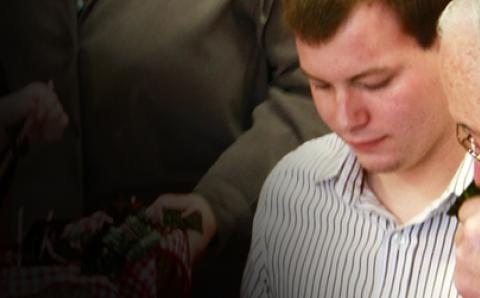An ancient memory lingers in my mind of the time my mother told me to walk across the street and borrow two eggs from Mrs. Klein. I was embarrassed, but Mrs. Klein showed no reluctance at all. In fact, she seemed happy to help.
A few weeks ago I was having a hard time putting a new battery in my car. As a last resort I walked two houses south, where a neighbor was puttering with his own car, and asked to borrow a Vise-Grip. Not only did he dig out the tool for me, he walked over and helped me do the job.
Ever since, my neighbor seems friendlier.
I was discovering a law of nature most of us don’t really believe: asking for a helping hand is more likely to endear than to irritate. Negotiating for the loan of a lawnmower is more likely to enhance friendship than it is to cause resentment.
For most people, reaching out for help is hard. We feel like we are imposing or taking advantage of people when we need to ask for anything—the loan of a tool, two eggs, or a helping hand. We want others to think well of us, and we assume that borrowing bothers people.
Jesus, on the other hand, wasn’t afraid to ask for help. One time he craved moral support from his closest friends. His heart was heavy, and he needed to go off and pray. So he asked his disciples to give him their presence, their wakefulness.
I wonder how many of us would dare to be that vulnerable and needy with anybody—even our closest friends. Would it feel like too much to invite friends to come along and wait—while we pray? I suspect we’d go alone.
Another time Jesus was thirsty, so he stopped at a well and asked a Samaritan woman for a drink of water.
Instead of modeling self-sufficiency, Jesus, the Son of God, chose to show vulnerability and admit his human weakness during his time on earth. He chose to show the disciples—and us—how to relate to others, to connect with people, to have fellowship with them.
Notice what happened after Jesus’ conversation with the woman at the well. He received the water, established a friendship, and entered a powerful conversation with her that led to a number of people coming to follow him.
When Jesus kneeled to wash the apostle Peter’s feet, Peter balked. He was sure it was beneath Jesus’ dignity to wash a fisherman’s dirty feet.
Like Peter, we have a lot to learn about giving and receiving. The lesson Jesus teaches us is this: to be mature disciples, we need to develop the capacity to receive. It’s a lesson we can summarize in three parts:
- Giving isn’t the only way to show love. Jesus shows what healthy humanness is like by relying on others. We should resist our tendency to cover our neediness.
- Giving an opportunity to help is a gift that benefits both giver and receiver. Ask and you’ll receive a lot more than you’d expect.
- Relationships are important. They grow stronger when we ask for help.
About the Author
Jim Kok is a clinical pastoral education supervisor and the author of The Miracle of Kindness.









